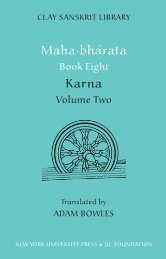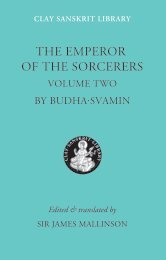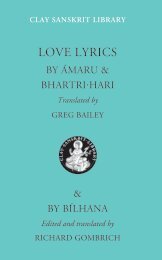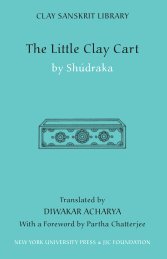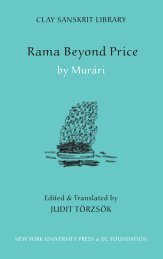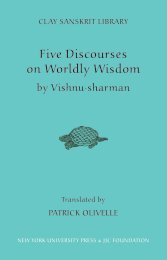Create successful ePaper yourself
Turn your PDF publications into a flip-book with our unique Google optimized e-Paper software.
CLAY SANSKRIT LIBRARY<br />
What ten<br />
young men Did<br />
by dandin<br />
clay sanskrit library<br />
Translated by<br />
ISABELLE ONIANS
THE CLAY SANSKRIT LIBRARY<br />
FOUNDED BY JOHN & JENNIFER CLAY<br />
EDITED BY<br />
RICHARD GOMBRICH<br />
WWW.CLAYSANSKRITLIBRARY.COM<br />
WWW.NYUPRESS.ORG
Copyright c○ 2005 by the CSL.<br />
All rights reserved.<br />
First Edition 2005<br />
The <strong>Clay</strong> <strong>Sanskrit</strong> <strong>Library</strong> is co-published by<br />
New York University Press<br />
and the JJC Foundation.<br />
Further information about this volume<br />
and the rest of the <strong>Clay</strong> <strong>Sanskrit</strong> <strong>Library</strong><br />
is available on the following Websites:<br />
www.claysanskritlibrary.com<br />
www.nyupress.org.<br />
ISBN 0-8147-6206-9<br />
Artwork by Robert Beer.<br />
Cover design by Isabelle Onians.<br />
Layout & typesetting by Somadeva Vasudeva.<br />
Printed in Great Britain by St Edmundsbury Press Ltd,<br />
Bury St Edmunds, Suffolk, on acid-free paper.<br />
Bound by Hunter & Foulis, Edinburgh, Scotland.
What Ten Young Men Did<br />
by Dan . d . in<br />
TRANSLATED BY<br />
ISABELLE ONIANS<br />
NEW YORK UNIVERSITY PRESS<br />
JJC FOUNDATION<br />
2005
Contents<br />
<strong>Sanskrit</strong> alphabetical order 7<br />
CSL conventions<br />
WHAT TEN YOUNG MEN DID<br />
7<br />
Introduction<br />
Part I: Postscript Beginning<br />
13<br />
Chapter 1: The Origins Of The Young Men 37<br />
Chapter 2: A FavorFor The Brahmin 81<br />
Chapter 3: What Soma·datta Did 99<br />
Chapter 4: What Pushpódbhava Did 113<br />
Chapter 5: What Raja·váhana Did 135<br />
Part II: Dandin’s Dasha·kumára·chárita<br />
Chapter 6: What Raja·váhana Did Next 169<br />
Chapter 7: What Apahára·varman Did 193<br />
Chapter 8: What Upahára·varman Did 279<br />
Chapter 9: What Artha·pala Did 325<br />
Chapter 10: What Prámati Did 363<br />
Chapter 11: What Mitra·gupta Did 395<br />
Chapter 12: What Mantra·gupta Did 457<br />
Chapter 13: What Víshruta Did 487<br />
Part III: Postscript Conclusion<br />
Chapter 14: What Víshruta Did Next 551<br />
Chapter 15: Finale 563<br />
Notes 577<br />
Cast Of Characters 619<br />
Index<br />
A sandhi grid is printed on the inside of the back cover<br />
629
11.60<br />
11.63<br />
11.66<br />
11.69<br />
what ten young men did<br />
‹Aho! raman. īyo ’yam. parvataAnitambaAbhāgah. ,kāntatar”<br />
êyam. gandhaApās.ān. avaty upatyakā, ´si´siram idam indīvar’AâravindaAmakarandaAbinduAcandrak’Aôttaram.<br />
gotraAvāri,<br />
ramyo ’yam anAekaAvarn. aAkusumaAmañjarīAmañjulataras taruAvan’Aābhoga<br />
iti!›<br />
aAtr.ptatarayādr.´sā bahuAbahu pa´syann aAlaks.it’Aâdhyārūd. haA<br />
ks.on. īAdharaA´sikharah. ´son. ībhūtam utprabhābhih. padmaArāgaAsopānaA´silābhih.<br />
kim api nālīkaAparāgaAdhūsaram. sarah.<br />
samadhyagamam. tatra snāta´scakām. ´s cid amr.taAsvādūn bisaAbha˙ngān<br />
āsvādya, am. saAlagnaAkalhāras tāraAvartinā ken’<br />
âpi bhīmaArūpen. a brahmaArāks.asen’ âbhipatya:<br />
‹Ko ’si? kutastyo ’s’ îti?›<br />
nirbhartsayat” âbhyadhīye. nirbhayena ca mayāso’bhyadhīyata:<br />
‹Saumya so ’ham asmi dviAjanmā. ´satruAhastād arn. avam,<br />
arn. avād YavanaAnāvam, YavanaAnāva´s citraAgrāvān. am enam.<br />
parvataApravaram. gato yadr.cchay” âsmin sarasi vi´srāntah. .<br />
bhadram. tav’ êti.›<br />
So ’brūta:<br />
‹Na ced bravīs.i pra´snān a´snāmi tvām iti.›<br />
May” ôktam:<br />
‹Pr.cchā tāvad bhavatu! iti›<br />
Ath’ āvayor ekay” āryay” āsīt samlāpah. :<br />
‹Kim. krūram. ?›<br />
‹strīAhr.dayam. .›<br />
‹Kim. gr.hin. ah. priyaAhitāya?›<br />
‹dāraAgun. āh. .›<br />
414
chapter 11: what mitra·gupta did<br />
‘Ah, how delightful is this mountain flank! How very<br />
charming this lowland with its sulfurous green and yellow<br />
stones! This mountain brook has cool water, moonlets of<br />
blue lotus nectar drops on its surface. And this forest expanse<br />
is particularly attractive, with clusters of multi-colored flowers.’<br />
My sight was not in the least satiated, but I kept on looking<br />
all around, without noticing that I had ascended to the peak<br />
of the earth-bearing mountain. There I discovered a pool,<br />
dusky-gray with lotus pollen, and ruddy with reflections<br />
from the ruby rocks forming its steps. I bathed, tasted some<br />
lotus fibers sweet as ambrosia, and had draped some white<br />
water lilies about my shoulders when a hideous-looking<br />
brahmin demon who lived on its bank fell upon me.*<br />
‘Who are you? Where have you come from?’ 11.60<br />
I was interrogated with menace. Fearless, I answered him:<br />
‘Gentle sir, I am a twice-born brahmin. Chance took me<br />
from the hand of my enemy into the ocean, from the ocean<br />
onto a Greek ship, and from the Greek ship to this superlative<br />
mountain of fabulous colored rocks, where I was resting<br />
beside this pool. Blessings be upon you.’<br />
He said: 11.63<br />
‘If you cannot answer my questions, I will eat you up.’<br />
Ireplied:<br />
‘Go ahead, ask!’ 11.66<br />
Our interchange fitted into a single arya verse:*<br />
‘What is cruel?’<br />
‘The heart of a woman.’<br />
‘What is dear and beneficial for a householder?’ 11.69<br />
‘The virtues of a housewife.’<br />
415
11.72<br />
11.75<br />
what ten young men did<br />
‹Kah. kāmah. ?›<br />
‹sa˙nkalpah. .›<br />
‹Kim. dus.karaAsādhanam. ?›<br />
‹prajñā.›<br />
Tatra DhūminīAGominīANimbavatīANitambavatyah. pra-<br />
mān. am ity›<br />
Upadis.t.o mayā so’brūta:<br />
‹Kathaya kīdr.´syas tāiti!›<br />
Atr’ ôdāharam:<br />
‹Asti Trigarto nāma janaApadah. .tatr’ āsan gr.hin. as trayah.<br />
sphītaAsāraAdhanāh. s’Aôdaryā DhanakaADhānyakaADhanyak’Aākhyāh.<br />
. tes.u jīvatsu na vavars.a vars.ān. idvāda´sa Da´saA´sat’A<br />
âks.ah. .<br />
Ks.īn. a Asāram. sasyam, os.adhyo vandhyāh. ,naphalavanto<br />
vanaspatayah. ,klībā meghāh. ,ks.īn. aAsrotasah. sravantyah. ,<br />
pa˙nkaA´ses.ān. i palvalāni, nirAnisyandāny utsaAman. d. alāni, viralībhūtam.<br />
kandaAmūlaAphalam, avahīnāh. kathāh. , galitāh.<br />
kalyān. ’AôtsavaAkriyāh. , bahulībhūtāni taskaraAkulāni,<br />
11.78 anyonyam abhaks.ayan prajāh. , paryalut.hann itasAtato ba-<br />
lākāApān. d. urān. i naraA´sirah. Akapālāni, paryahin. d. anta ´sus.kāh.<br />
kākaAman. d. alyah. , ´sūnyībhūtāni nagaraAgrāmaAkharvat.aAput.aA<br />
bhedan’Aādīni.<br />
Ta ete gr.haApatayah. sarvaAdhānyaAnicayam upayujy’ âj’Aâvikam.<br />
gavalaAgan. am. gavām. yūtham. dāsīAdāsaAjanam apatyāni<br />
jyes.t.haAmadhyamaAbhārye ca kramen. a bhaks.ayitvā:<br />
416
chapter 11: what mitra·gupta did<br />
‘What is desire?’<br />
‘Imagination.’<br />
‘What is the means to achieve the difficult?’<br />
‘Wisdom.<br />
And of these responses the respective proofs are: Dhúmi- 11.72<br />
ni, Gómini, Nímbavati and Nitámbavati.’<br />
When I had added that, he asked:<br />
‘Tell me, what sort of women are these?’*<br />
Thus I related:* 11.75<br />
‘There was a land called Tri·garta.* In that land there were<br />
three householders, full brothers, of swollen wealth and<br />
property. Their names were Dhánaka, Dhányaka and Dhanyaka—“Richard,”<br />
“Ritchie,” and “Rick.”* During their<br />
lifetime it came to pass that Indra of the thousand eyes<br />
withheld rain for twelve years.*<br />
The grain lost its kernel, plants became sterile, trees bore<br />
no fruit, the clouds were barren, streams lost their current,<br />
pools were no more than mud, springs all around ceased<br />
to flow, bulbs, roots and fruit were scarce, communication<br />
dried up, auspicious festivals and rituals melted away, and<br />
the community of thieves multiplied.<br />
The population fed on one another, human skulls pale as 11.78<br />
cranes rolled about hither and thither, rookeries of parched<br />
crows roamed about, and cities, villages, market towns,<br />
towns and everywhere became desolate.<br />
The aforementioned householders first used up all their<br />
stores of grain, before consuming in turn goats and sheep,<br />
their stock of buffaloes, their herd of cows, their female and<br />
male slaves, their children, and then the wives of the eldest<br />
and the middle brother. In the end they decided:<br />
417
11.81<br />
11.84<br />
what ten young men did<br />
«Kanis.t.haAbhāryā Dhūminī ´svo bhaks.an. īy” êti.»<br />
samakalpayan. ayam. kanis.t.ho Dhanyakah. priyām. svām<br />
attum aAks.amas tayā saha tasyām eva ni´sy apāsarat. mārgaA<br />
klāntām. c’ ôdvahan vanam. jagāhe.<br />
SvaAmām. s’Aâsr.gAapanītaAks.utApipāsām. tām. nayann antare<br />
kam api nikr.ttaApān. iApādaAkarn. aAnāsikam avaniApr.s.t.he vices.-<br />
t.amānam. purus.am adrāks.īt. tam apy ārdr’Aā´sayah. skandhen’<br />
ôdvahan kandaAmūlaAmr.gaAbahule gahan’Aôdde´se yatnaAraci-<br />
taAparn. aA´sāla´s ciram avasat. amum. ca ropitaAvran. am i˙ngudīA<br />
tail’Aādibhir āmis.en. a ´sāken’ ātmaAnirvi´ses.am. pupos.a.<br />
Pus.t.am. ca tam udriktaAdhātum ekadāmr.g’Aânves.an. āya ca<br />
prayāte Dhanyake sā Dhūminī riram. say” ôpātis.t.hat. bhar-<br />
tsit” âpi tena balātAkāram arīramat. nivr.ttam. ca patim uda-<br />
k’Aâbhyarthinam:<br />
«Uddhr.tya kūpāt piba! rujati me ´sirah. ´siroAroga iti.»<br />
udañcanam. sarajjum. pura´s ciks.epa. udañcantam. ca tam.<br />
kūpād apah. ks.an. āt pr.s.t.hato gatvā pran. unoda.<br />
Tam. ca vikalam. skandhen’ ôduhya de´sād de´s’Aântaram. pa-<br />
ribhramantī pativratāApratītim. lebhe bahuAvidhā´s capūjāh. .<br />
punar AvantiArāj’Aânugrahād atimahatyābhūtyā nyavasat.<br />
418
chapter 11: what mitra·gupta did<br />
“Tomorrow we will eat Dhúmini, our youngest brother’s<br />
wife.”<br />
This youngest brother, Dhanyaka, could not bear to eat 11.81<br />
his beloved. So that very night he fled, taking her with<br />
him. She became exhausted by the journey. With her on his<br />
shoulders they entered the forest.<br />
He warded off her hunger and thirst with his own flesh<br />
and blood and carried her on into the jungle. There on the<br />
way he saw a man writhing on his back, his hands, feet, ears<br />
and nose all amputated.* Dhanyaka’s heart melted and he<br />
bore him too on his shoulders until they came to a place deep<br />
in the wood where there were many bulbs, roots and deer.<br />
Here he labored to construct a leaf-shelter, where they lived<br />
for a long while. Dhanyaka healed the other man’s wounds<br />
with such treatments as íngudi oil, and he nourished him<br />
the same as himself with meat and vegetables.<br />
One day, when Dhanyaka had gone off to hunt for deer,<br />
Dhúmini wanted to enjoy herself and attended on the other<br />
man, now well fed and abounding in precious bodily fluids.<br />
Although he rebuffed her, she forcefully had her way. When<br />
her husband returned he asked for water, but she said:<br />
“Draw some from the well to drink. My head is splitting 11.84<br />
with a headache.”<br />
With which she tossed before him bucket and rope. Then,<br />
when he was drawing water from the well, she was behind<br />
him in a moment, and pushed him in.<br />
Dhúmini took the cripple on her shoulders and roamed<br />
from country to country. Acquiring a reputation as a pati·vrata,<br />
a“faithful wife,” she also received every kind of<br />
419
11.87<br />
what ten young men did<br />
Atha pānīy’ Aârthi Asārtha Ajana Asamāpatti Adr.s.t.’ Aôddhr.tam<br />
Avantis.u bhramantam āhār’Aârthinam. bhartāram upalabhya<br />
sā Dhūminī:<br />
«Yena me patir vikalīkr.tah. sa durātm” âyam iti!»<br />
Tasya sādho´s citraAvadham ajñena rājñāsamāde´sayām. cakāra.<br />
Dhanyakas tu dattaApa´scādAbandho vadhyaAbhūmim.<br />
nīyamānah. saA´ses.atvād āyus.ah. :<br />
11.90 «Yo mayā vikalīkr.to ’bhimato bhiks.uh. sa cen me pāpam<br />
ācaks.īta yukto me dan. d. aiti.»<br />
aAdīnam adhikr.tam. jagāda.<br />
«Ko dos.a iti?»<br />
11.93 upanīya dar´site ’mus.min sa vikalah. parya´sruh. pādaApati-<br />
tas tasya sādhos tatAsukr.tam aAsatyā´s catasyās tathāAbhūtam.<br />
du´scaritam āryaAbuddhir ācacaks.e. kupitena rājñā virūpitaAmukhī<br />
sādus.kr.taAkārin. īkr.tā ´svabhyah. pācikā. kr.ta´s ca<br />
Dhanyakah. prasādaAbhūmih. . tad bravīmi:<br />
«StrīAhr.dayam. krūram iti.» ›<br />
Punar anuyukto GominīAvr.tt’Aântam ākhyātavān:<br />
11.96 ‹Asti Dravid. es.u Kāñcī nāma nagarī. tasyām anAekaAkot.iA<br />
sārah. ´sres.t.hiAputrah. ´SaktiAkumāro nām’ āsīt. so ’s.t.āAda´saAvars.aAde´sīya´s<br />
cintām āpede:<br />
420
chapter 11: what mitra·gupta did<br />
worship. Eventually the king of Avánti Ujjáyini granted her<br />
his favor, so that she came to live in enormous prosperity.<br />
One day our Dhúmini caught sight of her erstwhile hus- 11.87<br />
band wandering through Avánti, begging for food. By chance<br />
he had been spotted and pulled out of the well by caravan<br />
traders looking for water. She accused:<br />
“This brute is the man who disfigured my husband!”<br />
Thereby she had the unknowing king sentence the good<br />
man to a violent death. But when Dhanyaka was being led<br />
to the execution ground, his hands bound behind his back,<br />
he boldly called to the one in charge of him, his life not<br />
over yet:<br />
“If the beggar I am charged with having mutilated con- 11.90<br />
demns me himself, then I deserve the punishment.”<br />
The officer thought:<br />
“What harm in checking?”<br />
He took Dhanyaka and showed him to the cripple, who 11.93<br />
threw himself at the good man’s feet in floods of tears.<br />
Noble-minded himself, he proclaimed the good deeds the<br />
accused had done, and all the evil actions of that wicked<br />
wife. The furious king had the evildoer’s face disfigured and<br />
made her a dog-eater, an outcaste.* Dhanyaka, on the other<br />
hand, he made the object of his generosity. This is the story<br />
that prompts me to conclude:<br />
“A woman’s heart is cruel.” ’<br />
Questioned again, I told Gómini’s story:*<br />
‘There was in the Dravidian country a city called Kan- 11.96<br />
chi.* There lived a merchant’s son named Shakti·kumára,<br />
amultimillionaire in wealth. When he was about to turn<br />
eighteen the thought struck him:<br />
421
what ten young men did<br />
«N’ âsty aAdārān. ām anAanugun. aAdārān. ām. vā sukham. nāma.<br />
tat katham. nu gun. avad vindeyam. kalatram? iti»<br />
Atha paraApratyay’Aāhr.tes.udāres.uyādr.cchikīm. sam. pattim<br />
anAabhisamīks.ya kārt’Aântiko nāma bhūtvā vastr’AântaApinaddhaA´sāliAprastho<br />
bhuvam. babhrāma.<br />
11.99 «Laks.an. aAjño ’yam iti.»<br />
amus.mai kanyāh. kanyāvantah. pradar´sayām. babhūvuh. .<br />
yām. kāñcil laks.an. avatīm. saAvarn. ām. kanyām. dr.s.t.vā sakila<br />
sma bravīti:<br />
«Bhadre, ´saknos.i kim anena ´sāliAprasthena gun. avad annam<br />
asmān abhyavahārayitum? iti»<br />
11.102 So hasit’Aâvadhūto gr.hād gr.ham. pravi´sy’ âbhramat.<br />
Ekadātu´Sibis.uKāverīAtīraApattane saha pitr.bhyām avasitaA<br />
maha”Arddhim ava´sīrn. aAbhavanaAsārām. dhātryā pradar´syamānām.<br />
kāñcana viralaAbhūs.an. ām. kumārīm. dadar´sa. asyām.<br />
sam. saktaAcaks.u´s c’âtarkayat:<br />
«Asyāh. khalu kanyakāyāh. sarva ev’ âvayavā n’âtiAsthūlā<br />
n’ âtiAkr.´sān’âtiAhrasvān’âtiAdīrghānavikat.āmr.jāvanta´s ca.<br />
11.105 RaktaAtal’Aâ˙ngulī yavaAmatsyaAkamalaAkala´s’AādyAanAekaA<br />
pun. yaAlekhāAlāñchitau karau, samaAgulphaAsandhīmām. salāv<br />
aA´sirālau c’ â˙nghrī, ja˙nghe c’ ânuApūrvaAvr.tte, pīvar’AûruA<br />
graste iva durAupalaks.ye jānunī, sakr.dAvibhakta´s caturAasrah.<br />
422
chapter 11: what mitra·gupta did<br />
“There is no happiness for those who have no wife, nor<br />
for those who have the wrong sort of wife. But how am I to<br />
find a wife with qualities?”<br />
Not expecting chance success with a wife chosen on the<br />
advice of others, he disguised himself as a fortune-teller,<br />
and with a package of rice tied up in the hem of his clothes<br />
he travelled the earth. When they saw him, all those with<br />
daughters thought:<br />
“He has the auspicious marks.” 11.99<br />
Hence they brought their daughters to show him. But every<br />
time he was presented with a maiden with the auspicious<br />
marks and of his caste,* he asked her, the story goes:<br />
“Good lady, are you able to prepare for us some good food<br />
with this kilo of rice?”<br />
Laughed at and rejected, he roamed in this fashion from 11.102<br />
house to house.<br />
Then one day among the Shibis, in a town on the bank<br />
of the Kavéri River,* he saw a maiden with hardly any ornaments,<br />
presented to him by her nurse. She had lost not<br />
only her parents but also her great wealth, and her house<br />
and property had been dispersed. His eyes riveted on her,<br />
he considered:<br />
“Not one of this girl’s limbs is too thick or too thin, too<br />
short or too long. They are none of them deformed but are<br />
all splendid.<br />
Her two hands with their red, hennaed fingers and palms 11.105<br />
are bedecked with many auspicious marks such as barleycorn,<br />
fish, lotus, vase and the rest.* Her strong calves have<br />
even ankles and are free of prominent veins, her legs taper<br />
regularly, and her two knees are scarcely visible but, as it<br />
423
what ten young men did<br />
kakundaraAvibhāgaA´sobhī rath’Aâ˙ng’AākāraAsam. sthita´s canitambaAbhāgah.<br />
,tanutaram īs.anAnimnam. gambhīram. nābhiA<br />
man. d. alam. ,valiAtrayen. ac’âlam. kr.tam udaram;<br />
urobhāgaAvyāpināv unmagnaAcūcukau vi´sāl’AārambhaA´sobhinau<br />
payodharau, dhanaAdhānyaAputraAbhūyastvaAcihnaA<br />
lekhāAlāñchitaAtale snigdh’AôdagraAkomalaAnakhaAman. īr.jvAanupūrvaAvr.ttaAtāmr’Aâ˙ngulī<br />
sam. nat’Aâm. saAde´se saukumāryavatyau<br />
nimagnaAparvaAsandhīcabāhuAlate;<br />
tanvī kambu Avr.tta Abandhurā cakandharā, vr.tta AmadhyaAvibhaktaArāg’Aâdharam<br />
aAsa˙nks.iptaAcāruAcibukam āpūrn.<br />
a Akat.hina Agan. d. a Aman. d. alam a Asa˙nga Atānu Avakra Anīla AsnigdhaAbhrūAlatam<br />
anAatipraud. haAtilaAkusumaAsadr.´saAnāsikam<br />
aAsitaAdhavalaAraktaAtriAbhāgaAbhāsuraAmadhur’AâdhīraAsa-<br />
ñcāraAmanthar’Aāyat’Aēks.an. am induA´sakalaAsundaraAlalāt.am<br />
indraAnīlaA´sil”AākāraAramy’AâlakaApa˙nkti dviAgun. aAkun. d. alitaA<br />
mlānaAnālīkaAnālaAlalitaAlambaA´sravan. aApā´saAyugalam ānanaA<br />
kamalam;<br />
11.108 anAatibha˙nguro bahulah. paryante ’py aAkapilaArucir āyā-<br />
mavān ek’AâikaAnisargaAsamaAsnigdhaAnīlo gandhaAgrāhī ca<br />
mūrdhajaAkalāpah. .<br />
S” êyam ākr.tir na vyabhicarati ´sīlam. āsajjati ca me hr.dayam<br />
asyām eva. tat parīks.y’ âinām udvaheyam. aAvimr.-<br />
424
chapter 11: what mitra·gupta did<br />
were, are swallowed up by her plump thighs. The radiant<br />
region of her hips is perfectly symmetrical and all square,<br />
and her buttocks curved like chariot wheels. The very graceful<br />
circle of her navel is deep and slightly indented, and her<br />
belly is decorated with the ideal three folds.<br />
Herbreasts are lovely, with broad beginnings, covering her<br />
whole bosom, and pert nipples. Her long slim arms with<br />
their discreet joints flow ever so softly from her sloping<br />
shoulders. Their surface is decorated with marks signifying<br />
an abundance of wealth, grain and sons. Her nails are like<br />
redjewels, glossy, long and delicate, and her fingers straight,<br />
regularly rounded and reddish.<br />
Her slender neck is curved and undulating like a conch<br />
shell. Her face is a lotus. Her red lips pout in the middle,<br />
and her dear chin is strong and present. The globes of her<br />
cheeks are full and firm, her blue-black glistening gracefully<br />
arched eyebrows do not join, her nose is like a sesame flower<br />
in first bloom. Her eyes, deep and long, are black and white,<br />
and red in the outer corners, shining, rolling and sweetly<br />
tremulous. Her brow is lovely as the crescent moon. Her<br />
fringe of delightful locks is like sapphire gems. And the<br />
lobes of her twin beautiful ears are adorned with twicecoiled<br />
wilting lotus stalks.<br />
Her whole head of hair was not too curled, and plentiful, 11.108<br />
and even at the very tips not tawny in color, long, blue-black<br />
and glossy, each strand growing evenly, and sweet-smelling.<br />
This body before me must represent also her character.*<br />
My heart is set on this girl already. But I shall put her to the<br />
test before taking her in marriage. For it is a fact that regret<br />
425
what ten young men did<br />
´syaAkārin. āhiniyatam anekāh. patanty anu´sayaAparam. parā<br />
iti.»<br />
SnigdhaAdr.s.t.ir ācas.t.a:<br />
11.111 «Bhadre, kaccid asti kau´salam. ´sāliAprasthen’ ânena sam. -<br />
pannam āhāram asmān abhyavahārayitum? iti»<br />
Tatas tayāvr.ddhaAdāsīs’Aākūtam ālokitā. tasya hastāt prasthaAmātram.<br />
dhānyam ādāya kva cid alind’Aôdde´se suAsiktaA<br />
sam. mr.s.t.e dattaApādaA´saucam upāve´sayat. sā kanyā tān gandhaA´sālīn<br />
sa˙nks.udya mātrayā vi´sos.y’ ātape muhur muhuh.<br />
parivartya sthiraAsamāyām. bhūmau nālīApr.s.t.hena mr.duAmr.du<br />
ghat.t.ayantī tus.air aAkhan. d. ais tan. d. ulān pr.thak cakāra.<br />
jagāda ca dhātrīm:<br />
«Mātah. , ebhis tus.air arthino bhūs.an. aAmr.jāAkriyāAks.amaih.<br />
svarn. aAkārāh. .tebhya imān dattvā labdhābhih. kākin. ībhih.<br />
sthiratarān. yanAatyAārdrān. in’âtiA´sus.kān. ikās.t.hāni, mitam. A<br />
pacām. sthālīm ubhe ´sarāve c’ āhar’ êti!»<br />
11.114 TathāAkr.te tayātām. stan. d. ulān anAatiAnimn’AôttānaAvistīrn. aA<br />
kuks.au kakubh’Aôlūkhale lohaApatraAves.t.itaAmukhena samaA<br />
´sarīren. avibhāvyamānaAmadhyaAtānavena vyāyatena gurun. ā<br />
khādiren. amusalena caturaAlalit’Aôtks.epan. ’Aâvaks.epan. ’AāyāsitaAbhujam<br />
aAsakr.d a˙ngulībhir uddhr.ty’ ôddhr.ty’ âvahatya<br />
´sūrpaA´sodhitaAkan. aAkim. ´sārukām. stan. d. ulān aAsakr.d adbhih.<br />
praks.ālya, kvathitaApañcaAgun. ejale dattaAcullīApūjā prāks.ipat.<br />
426
chapter 11: what mitra·gupta did<br />
succeeds regret in succession for the man who acts without<br />
deliberation.”<br />
With an affectionate look he asked:<br />
“Good lady, do you have the skill to prepare for us a 11.111<br />
wonderful meal from this kilo of rice?”<br />
In response she gave the old servant woman a meaningful<br />
look. Taking the kilo of rice grain from the man’s hand, the<br />
old lady gave him water to clean his feet before inviting him<br />
to sit down on the terrace before the door, well sprinkled and<br />
swept. The girl pounded the fragrant rice a little,* and dried<br />
it in the sun, turning it over many times. Then, rubbing it<br />
ever so delicately with the back of a stalk on some firm and<br />
even ground, she separated the grains from the unbroken<br />
husks. She directed her nurse:<br />
“Mother, the goldsmiths need these husks to polish their<br />
jewelry. Give them these and with the small change you get<br />
in return* bring some solid firewood, not too sappy and not<br />
too dry, a small clay cooking pot, and a pair of platters.”<br />
When the old woman had done all that, the girl took a 11.114<br />
long, heavy khádira wood pestle of solid body with slender<br />
middle, its face dressed in a sheet of iron, and a kákubha<br />
wood mortar whose belly was not too deep, but shallow<br />
and broad.* Placing those grains in the mortar, she fatigued<br />
her arms tossing the pestle up and throwing it down with<br />
graceful skill. All the time she kept separating, lifting and<br />
threshing the rice with her fingers. With a winnowing basket<br />
she sieved off dust and the noxious awn. Then she washed<br />
the grains many times with water, and, offering a small<br />
amount in sacrifice to the hearth, she threw the rice into<br />
boiling water five times its quantity.<br />
427
11.117<br />
what ten young men did<br />
Pra´slath’Aâvayaves.u prasphuratsu tan. d. ules.u mukul’Aâva-<br />
sthām ativartamānes.u sa˙nks.ipy’ ânalam upahitaAmukhaApi-<br />
dhānayā sthāly” ânnaAman. d. am agālayat. darvyā c’âvagha-<br />
t.t.ya mātrayā parivartya samaApakves.u sikthes.u tām. sthālīm<br />
adhoAmukhīm avātis.t.hipat.<br />
Indhanāny antah. Asārān. y ambhasā samabhyuks.ya pra´sa-<br />
mit’Aâgnīni kr.s.n. ’Aâ˙ngārīkr.tya tadAarthibhyah. prāhin. ot:<br />
«Ebhir labdhāh. kākin. īr dattvā ´sākam. ghr.tam. dadhi tailam<br />
āmalakam. ciñcāAphalam. ca yathāAlābham ānay’ êti!»<br />
Tath” ânus.t.hite ca tayā dvitrān upadam. ´sān upapādya tadA<br />
annaAman. d. am ārdraAvāluk”AôpahitaAnavaA´sar’Aâvagatam ati-<br />
mr.dunā tālaAvr.nt’Aânilena ´sītalīkr.tya saAlavan. aAsambhāram.<br />
datt’Aâ˙ngāraAdhūpaAvāsam. ca sam. pādya, tad apy āmalakam.<br />
´slaks.n. aApis.t.am utpalaAgandhi kr.tvādhātrīAmukhena snānāya<br />
tam acodayat.<br />
TayācasnānaA´suddhayā dattaAtail’Aāmalakah. kramen. a sa-<br />
snau. snātah. siktaAmr.s.t.e kut.t.ime phalakam āruhya pān. d. uA<br />
haritasya triAbhāgaA´ses.aAlūnasya a˙ngan. aAkadalīApalā´sasy’ ôpari<br />
´sarāvaAdvayam. dattam ārdram abhimr.´sann atis.t.hat.<br />
428
chapter 11: what mitra·gupta did<br />
When the grains of rice were quite flaccid all over and<br />
swelling, like closed buds no longer, she reduced the fire.<br />
She strained the scum from the boiled rice by covering the<br />
mouth of the pot with its lid.* Then, with a ladle, she<br />
knocked and stirred the rice carefully around. Once the<br />
boiled rice was evenly cooked she tipped the pot over, face<br />
downward.<br />
The firewood that was still strong inside she sprinkled<br />
with water to extinguish its fire,thus creating black charcoal.<br />
This she dispatched to those who wanted it, telling her<br />
nurse:<br />
“With the small change you receive for these pieces of 11.117<br />
charcoal, bring whatever vegetables, ghee, curd, oil, myrobalan<br />
and tamarind fruit you can purchase.”<br />
After the old woman had done as she was asked, the girl<br />
prepared two or three vegetable relishes. She had poured<br />
the boiled rice scum down into a new grass cup placed on<br />
wet sand. Now she cooled it by fanning an extremely soft<br />
breeze with a palm leaf. She finished this preparation by<br />
adding salt and the fragrance from frankincense that she<br />
had placed on the coals. As for the myrobalan, she ground<br />
it finely to release the lotus perfume, and had her nurse press<br />
their guest to bathe.<br />
The girl was clean, having already bathed. She handed<br />
Shakti·kumára oil and astringent myrobalan so he could<br />
bathe and freshen up in turn. Once he had bathed, he took<br />
his place on a wooden seat on the sprinkled and swept paved<br />
floor. He sat touching the two damp platters he had been<br />
given, placed on a quarter cut from a pale-green leaf from<br />
the plantain in the courtyard.<br />
429
11.120<br />
what ten young men did<br />
Sā tutām. peyām ev’ âgre samupāharat. pītvā c’âpa-<br />
nīt’AâdhvaAklamah. prahr.s.t.ah. praklinnaAsakalaAgātrah. sthito<br />
’bhūt. tatas tasya ´sālyAodanasya darvīAdvayam. dattvā sarpirA<br />
mātrām. sūpam upadam´sam. c’ ôpajahāra. imam. ca dadhnā<br />
ca triAjātak’Aâvacūrn. itena surabhiA´sītalābhyām. ca kāla´seyaA<br />
kāñjikābhyām. ´ses.am annam abhojayat. saA´ses.a ev’ ândhasy<br />
asāv atr.pyat.<br />
Ayācata ca pānīyam. atha navaAbhr.˙ngāraAsambhr.tam aAguruAdhūpaAdhūpitam<br />
abhinavaApāt.alīAkusumaAvāsitam utphull’AôtpalaAgrathitaAsaurabham.<br />
vāri nālīAdhār’Aātmanāpātayām.<br />
babhūva.<br />
So ’pi mukh’AôpahitaA´sarāven. ahimaA´si´siraAkan. aAkarālit’A<br />
ârun. āyamān’Aâks.iApaks.mā dhāraArav’AâbhinanditaA´sravan. ah.<br />
spar´saAsukh’AôdbhinnaArom’AāñcaAkarka´saAkapolah. parimalaApravāl’Aôtpīd.<br />
aAphullaAghrān. aArandhro mādhuryaAprakars.’AāvarjitaArasan”Aêndriyas<br />
tad accham. pānīyam ākan. t.ham.<br />
papau.<br />
´Sirah. Akam. 11.123<br />
paAsam. jñāAvāritā capunar aparaAkaraken. ’ āca-<br />
manam adatta kanyā. vr.ddhayā tutadAucchis.t.am apohya<br />
haritaAgomay’Aôpalipte kut.t.ime svam ev’ ôttarīyaAkarpat.am.<br />
vyavadhāya ks.an. am a´seta.<br />
430
chapter 11: what mitra·gupta did<br />
First, she served him the aforementioned rice-gruel. When 11.120<br />
he had drunk it he sat there refreshed, the road’s fatigue<br />
banished and his every limb rehydrated. Next, she gave<br />
him two ladles full of the good boiled rice and offered him<br />
a sauce of pure clarified butter and a relish.* Finally, she<br />
offered him the rest of the rice to eat, with curd sprinkled<br />
with the three spices (mace, cardamon and cinnamon) and<br />
with both buttermilk and sour gruel, fragrant and cool.<br />
Once he had eaten his fill there was still some food left over.<br />
He requested water. Accordingly she poured a stream of<br />
water through a tube, water that had been collected in a<br />
new pitcher and fumigated with aloe, perfumed with newly<br />
opened pátali red begonia flowers and infused with the scent<br />
of full-blown lotuses.<br />
He then raised the dish to his mouth and from it drank<br />
his throat full of that clear water.* As he did so his eyelashes*<br />
looked reddish and magnified by drops cold as snow. His<br />
ears rejoiced in the singsong of the flowing water, his cheeks<br />
were rugged with horripilating down from the blissful sensation,<br />
his nostrils flared with the gushing flow of astream<br />
of scent, and his tongue was prostrate with the heights<br />
of sweetness.<br />
Signalled to stop by a nod of the head, the maiden then 11.123<br />
presented him with water from another small water pot to<br />
ritually rinse his mouth.* The old lady removed the leftovers,<br />
and when the pavement had been smeared with fresh<br />
green cow dung, Shakti·kumára spread out his ragged cloak<br />
and lay down for a while.<br />
431
WWW.CLAYSANSKRITLIBRARY.COM<br />
What Ten Young Men Did is a coming-of-age novel from<br />
the seventh century CE. In combat and in the bedroom, ten<br />
individuals juggle virtue and vice on their heroic progress from<br />
adolescence to maturity.<br />
NEW YORK UNIVERSITY PRESS<br />
Washington Square<br />
New York, NY 10003<br />
www.nyupress.org




